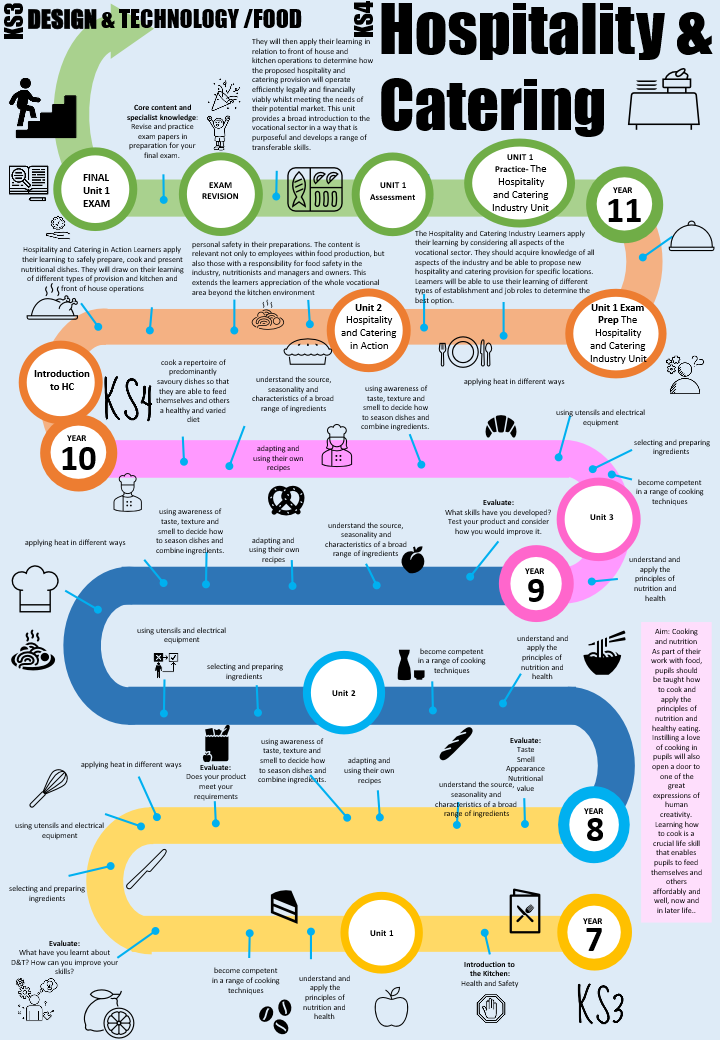Curriculum Intent
At Winterton Community Academy, the National Curriculum is at the heart of our Design and Technology programme of study.
Our intent is to design a curriculum, which is carefully mapped to provide pupils with the skills and knowledge. This will allow them to access a range of creative activities to build on learning, which will form a path to courses at Key Stage 4.
With our inclusive approach and high aspirations, we will provide opportunities for all learners, regardless of context, to thrive in the Design Technology and Catering industries.
We aim to provide pupils with experiences, that will enrich and inspire them creatively and give them cultural capital to become essential policy makers, thinkers and creative minds, which will share our world.
Our Design and Technology curriculum is underpinned by the academy’s values of ‘Respect, Hard Word and Positivity’.
Through the Design Technology education, we aim to broaden our pupils’ emotional and multicultural awareness, developing values and building respect and tolerance through the study Design considering user needs.
We aim to equip students with essential practical skills and Design Technology application, alongside developing the range of subject vocabulary.
Implementation
The Design and Technology curriculum is taught in a rotation. This enables students to receive resistant materials and food and nutrition through design technology over the course of the year.
The programme of study is designed to map a curriculum pathway to a level 2 course Hospitality and Catering. This is known as a curriculum road map. This also includes skills for 3D architecture (Art 3D).

Impact
The curriculum sets out what is being taught to enable pupils to have a deepened understanding of the required knowledge and application of skills.
Planned and scheduled half-termly assessments for each year group across the breadth of the curriculum with a particular focus linked to the appropriate curriculum content:
• Pupils are taught in smaller mixed ability group
• Half termly data collections to monitor pupil progress and identify the required subsequent actions
• Pupil Voice activities
• Pupil engagement in Extended Learning tasks
• Monitoring of Teaching and Learning within lessons
• Work scrutiny activities
• Line Management Meetings
• Departmental Meetings
These qualitative assurance methods are not definitive and others will be included. However, they are essential in evaluating the impact of the curriculum.
Key Stage 3
The curriculum in Key Stage 3 (Years 7, 8 & 9) is broad and balanced across Design and Technology ensuring all pupils are provided with exposure to the knowledge and skills required to enable progress.
- Develop the creative, technical and practical expertise needed to perform everyday tasks confidently and to participate successfully in an increasingly technological world
- Build and apply a repertoire of knowledge, understanding and skills in order to design and make high-quality prototypes and products for a wide range of users
- Critique, evaluate and test their ideas and products and the work of others
- Understand and apply the principles of nutrition and learn how to cook
Key Stage 4
The Key Stage 4 curriculum is studied in Years 10 & 11 (a 2 year curriculum)
Hospitality and Catering
Our programme will provide pupils with knowledge of the hospitality and catering sector including all businesses that provide food, beverages and/or accommodation services. This is in response to the British Hospitality Association who state that hospitality and catering, is Britain’s fourth largest industry and accounts for around 10% of the total workforce. Since 2010, over 25% of all new jobs have been within the hospitality and catering sector with the majority of new roles falling within the 18-24 age group, according to a report by People 1P st P.
The projects we will cover include:
Unit 1 – Understanding the importance of nutrition. How cooking methods can impact on nutritional value 2.2.1 Factors affecting menu planning 2.2.2 How to plan production 2.3.1 How to prepare and make dishes 2.3.2 Presentation techniques 2.3.3 Food safety practices 2.4.1 Reviewing of dishes 2.4.2 Reviewing own performance.
Unit 2 – Practical: Building preparation and cooking skills and learn through practice.
Externally set Unit 2 Brief usually in Year 11.
Unit 3 – Exam Externally set.
Home Learning
Homework is an essential element of creative study. Independence and resilience are vital to the process of designing marking products. t also enables everyone to further enhance their understanding of the subject. Tasks will vary depending on the subject and Key Stage, but may include reading, writing, research, revision and sketching, photography, CAD CAM, computing, cookery preparation and related project work.
Publications
In the department we are committed to lifelong learning and as staff following the principles of the following publications.
Books
Luckin R S Puntambekar, Goodyear, R Grabowski, B L Winters, N Underwood, J., 2013. Handbook of Design in Educational Technology Copyright Year 2013.
Sherrington T, 2020. Rosenshine’s Principles in Action. John Catt Educational.
Journal Publications
AD magazine, The International Journal of Art & Design Education (iJADE).
Mawson B, 2003. Beyond the Design Process: An alternative pedagogy for technology education. International Journal of Technology and Design Education, 13(2), pp. 117-128.
Middleton H, 2005. Creative thinking, values and design and technology education. International Journal of Technology and Design Education, 15(1), pp. 61-71.
Lewis T, 2005. Creativity A Framework for the Design/Problem Solving Discourse in Technology Education. Journal of Technology Education, 17(1), pp. 35-52.